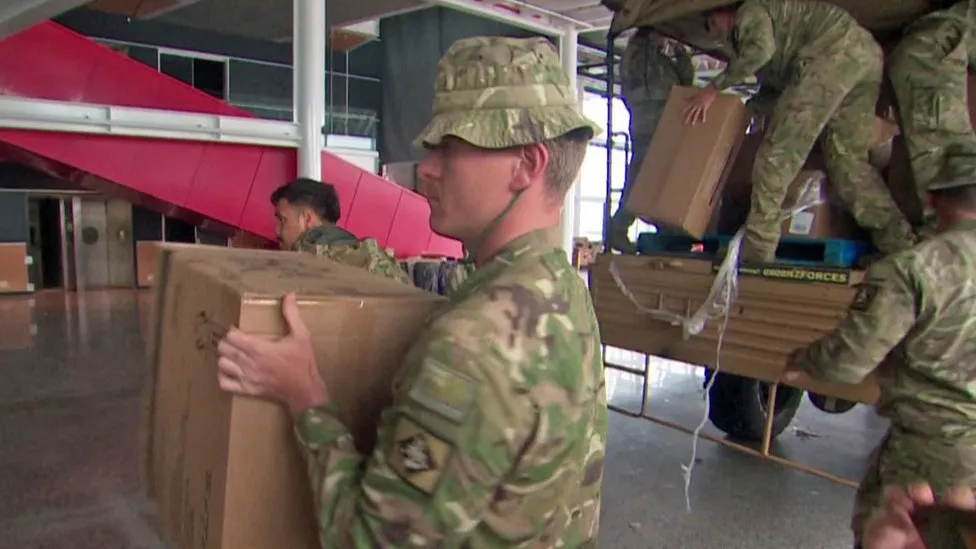New Zealand storm Gabrielle: Tense wait as ex-cyclone moves over North Island
Thousands of people are reported to be without power in New Zealand's upper North Island as the remnants of a tropical cyclone hit the country.
Gabrielle was downgraded from a category two to a category one storm before it made landfall but is still forecast to bring severe weather.
The regions of Northland and Auckland are currently under a state of emergency.
Parts of the North Island were badly damaged by flooding only weeks ago.
Northland declared a state of emergency then too over fears of unprecedented rain, but those concerns proved to be unfounded.
This time, however, gale force winds and heavy rain have been reported, leaving as many as 22,000 people at a time without power in the region, according to local media.
Some residents have been warned that it may take days for power to be restored.
Far North mayor Moko Tepani told Television New Zealand that he thought the roof of his house was going to blow off because the wind was so strong.
People who knew their homes were flood-prone were advised to evacuate ahead of the storm's arrival.
Declaring a state of emergency gives local authorities greater power to respond to dangerous situations and allows them to restrict travel and provide aid.
Further south in the country's largest city, Auckland, there have also been reports of people losing power due to strong winds.
Authorities issued a red weather alert - meaning severe gales, flooding and land slips are possible.
Schools have once again been advised to move learning online, trains have been cancelled and emergency shelters have been set up in preparation for the storm.
Air New Zealand, the country's national carrier, has announced it would cancel multiple long-haul international fights, Tasman and Pacific Island flights, and domestic services in and out of Auckland planned for Monday, when the worst of the bad weather is expected.
Thousands of homes suffered damage in January's record-breaking rainfall, which caused severe flooding and landslides, and four people died.
Residents are on high alert as they have been warned that the sodden ground and weakened infrastructure from the recent deluge could mean parts of the city will flood again more easily.
They have been using sandbags to try and people protect their houses and long queues have been forming at supermarkets after the authorities advised people to have enough supplies to last at least three days in case the situation deteriorated.
"The water was knee-deep," one man who was filling up sandbags and a public facility told Television New Zealand. "You never know what`s going to happen in the next two days."
"We had the creak behind us burst its banks, and it was pretty much against our back fence," said another.
New Zealand's prime minister, Chris Hipkins, has asked people to take the severe weather warnings seriously and to make sure they are prepared.
"Central and local government have been working very closely to prepare for this event and also to make sure the early lessons that can be captured from our response a week or two back can be incorporated into this one."
Thousands of people are already reported to be without power on the Coromandel Peninsula - where major roads connecting the mainly rural communities have been closed or are under warnings.
Residents in vulnerable areas there and in Tairāwhiti have also been urged to seriously consider evacuating.
The latter region, which lies New Zealand's east coast, is especially prone to flooding.
Instances where residents in small towns and settlements have had to band together to protect each other and their properties have become more common in recent years.
The tiny Australian territory of Norfolk Island, which lies north of New Zealand, had a lucky escape after the storm's most destructive winds bypassed it.
Norfolk Island's emergency controller, George Plant, told ABC News there were some emergency calls but that an initial assessment suggests the damage was "manageable".
"We're feeling very fortunate as a community that we didn't cop the full brunt of what Gabrielle had to offer," resident Hannah Taylor said.
"If she had moved a few a little bit south, we would have seen a lot more damage."

Comments
Post a Comment